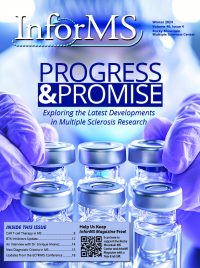
A Series of Briefs from the 2024 ECTRIMS Conference
 The European Committee for Treatment and Research in Multiple Sclerosis (ECTRIMS) conference is the world’s largest gathering focused on advancements in MS research and care. Held annually, it serves as a platform for scientists, clinicians, and healthcare professionals to present research, discuss emerging therapies, and share clinical practices aimed at improving outcomes for people living with MS.
The European Committee for Treatment and Research in Multiple Sclerosis (ECTRIMS) conference is the world’s largest gathering focused on advancements in MS research and care. Held annually, it serves as a platform for scientists, clinicians, and healthcare professionals to present research, discuss emerging therapies, and share clinical practices aimed at improving outcomes for people living with MS.
This year’s conference was held in Copenhagen, Denmark in September. Below is a brief round-up of updates from the 2024 ECTRIMS conference.
BRAIN HEALTH: TIME MATTERS
The Brain Health – Time Matters report, updated from the original report in 2015, launched in September 2024 and addresses advancements and key needs in MS, neuromyelitis optica spectrum disorder (NMOSD), and myelin oligodendrocyte glycoprotein antibody-associated disease (MOGAD) care. The report advocates for policy changes to improve lives, emphasizing early diagnosis, high-efficacy treatments, and holistic, person-centered care to reduce disability and socio-economic burdens. Brain Health-Time Matters highlights the importance of timely treatment, relapse prevention, and personalized care and is authored by Dr. Gavin Giovannoni (Blizard Institute, Barts and the London School of Medicine and Dentistry Queen Mary University of London) and others. CLICK HERE FOR MORE.
SIMVASTATIN STUDY
High-dose simvastatin, a common cholesterol-lowering drug, failed to slow disability progression in adults with secondary progressive MS, according to a Phase 3 study. Despite previous Phase 2 findings that showed a reduction in brain atrophy, this larger trial with 964 participants with secondary progressive MS found no significant difference in disability progression between the simvastatin and placebo groups over four years. These findings were reported by Jeremy Chataway, PhD (University College London) and the paper is titled “Evaluating the effectiveness of simvastatin in slowing the progression of disability in secondary progressive multiple sclerosis (MS-STAT2 trial): a multicentre, randomised controlled, double-blind phase 3 clinical trial.” CLICK HERE FOR MORE.
LIPOIC ACID
A phase 2 international trial investigated the effects of the antioxidant lipoic acid in progressive MS. Unfortunately, lipoic acid did not significantly improve walking measures or pain. Lipoic acid was also associated with frequent side effects, leading some participants to discontinue. These results were reported by Dr. Rebecca Spain (University of Oregon) and the paper is titled “Lipoic Acid for Treatment of Progressive Multiple Sclerosis; Results of a Phase 2 Randomized Placebo Controlled Trial.” CLICK HERE FOR MORE.
COMORBIDITY CONTROL MIGHT SLOW MS ACTIVITY
A major study links multiple comorbidities (other co-existing conditions or diseases like high blood pressure, diabetes or depression) with faster progression in MS, highlighting the need for routine management of these conditions. Data from 17 MS trials with a total of 16,794 participants revealed that having three or more comorbidities increased MS activity risk by 14%, and 30% increase in disability worsening. This evidence further supports proactive management of comorbidities to help improve MS outcomes. These findings were reported by Amber Salter, PhD (UT Southwestern, Dallas) and the paper is titled “The Association of Comorbidities and Disease Activity in Phase III Clinical Trials for Disease-Modifying Therapies in Multiple Sclerosis.” CLICK HERE FOR MORE.
DIET & BRAIN ATROPHY
A recent study in a large MS cohort of 700 people found that adherence to a Mediterranean diet is linked to less brain atrophy. The Mediterranean Diet is centered around fruits, vegetables, whole grains, legumes, nuts, seeds, and healthy fats like olive oil. It also includes moderate amounts of dairy, poultry, eggs, and seafood. The diet advises eating little to no red meats, sugar, highly processed foods, and butter. The study showed that worse adherence to the Mediterranean Diet was linked to increased brain atrophy. Specific dietary factors, such as increased olive oil use and higher vegetable consumption, were especially related to lower loss of brain volume. These findings support the role of diet in MS brain health, though further longitudinal and interventional studies are needed. Dr. Ilana Katz Sand (Mt. Sinai, New York) led the study and the paper is titled “Mediterranean Diet is Associated with a Proxy for Atrophy in Multiple Sclerosis.” CLICK HERE FOR MORE.
B-CELL MEDICATIONS & BREAST MILK
The SOPRANINO study is the first to examine the pharmacodynamics and pharmacokinetics of the MS therapy ocrelizumab in breastfed infants. Thirteen mothers with MS resumed ocrelizumab postpartum, and their infants, aged 2–24 weeks, were monitored for one year. Preliminary results show undetectable ocrelizumab serum levels in infants at 30 days post-infusion, with adverse events in infants consistent with common childhood illnesses, including one case of bronchiolitis. Full results, including B-cell levels in infants and breastmilk ocrelizumab transfer data, will provide guidance on ocrelizumab safety for breastfeeding mothers with MS. The study was presented by Dr. Riley Bove (University of California, San Francisco) and the paper is titled “B-cell levels and breastmilk transfer in infants of lactating women with multiple sclerosis treated with ocrelizumab: Primary results of the prospective multicenter, open-label Phase IV study SOPRANINO.” CLICK HERE FOR MORE.
GENES IDENTIFIED IN HISPANIC AND AFRICAN AMERICANS
Dr. Jacob McCauley (University of Miami), representing the Alliance for Research in Hispanic MS Consortium, presented a genetic analysis involving 7,000 individuals from Hispanic and African American backgrounds. The study uncovered a novel gene variant linked to MS risk in African Americans, located in a genome region tied to immune T cells, key players in MS. Additionally, they identified a gene with distinct variants: one increasing risk in Europeans and another in Hispanic and African Americans. Ongoing research aims to explore how these genes influence MS and their potential interactions with environmental and lifestyle factors. The paper is titled “Novel ancestry-specific and putative causal genetic variants for multiple sclerosis identified by an ancestry informed regression and trans-ethnic fine-mapping analysis.” CLICK HERE FOR MORE.
VITAMIN D
A study showing that high-dose oral vitamin D3 (100,000 IU every two weeks for 24 months) reduced disease activity significantly more than inactive placebo in 303 individuals who had experienced a neurologic event suggestive of MS (clinically isolate syndrome). The treatment delayed occurrence of disease activity and was well tolerated. Participants who benefited most had no spinal cord damage on imaging, severe vitamin D deficiency, and maintained a healthy weight. While studies on high-dose vitamin D in MS have yielded very mixed results and there is controversy about the role vitamin D may or may not have in MS, this research adds to evidence that suggests vitamin D could play an important role in MS management. Dr. Eric Thouvenot (University Hospital of Nîmes, France) presented these findings and the paper is titled “High-dose cholecalciferol reduces multiple sclerosis disease activity after a clinically isolated syndrome : results of a 24-month placebo-controlled randomized trial (D-lay MS).” CLICK HERE FOR MORE.
GENDER DISPARITIES IN MS TREATMENT
A study highlighted gender disparities in treating women with MS often due to pregnancy-related concerns. Analysis of 22,657 patients from the French MS registry showed women were less likely to receive disease-modifying therapies, especially high-efficacy ones, leading to poorer disease control and increased disability risks. The findings stress the need for better treatment strategies, balancing reproductive goals with effective care. Recommendations include educating patients, training neurologists, and using real-world data to reduce therapeutic inertia and improve outcomes for women with MS. The study was presented by Dr. Sandra Vukusic (Lyon University Hospital, France) and the paper is titled “Is there therapeutic inertia in women with MS?” CLICK HERE FOR MORE.
EXERCISE & MS
The “Step for MS” trial, funded by the Patient-Centered Outcomes Research Institute is a Phase 3 study which involved 379 participants with walking impairments and moderate disability. Participants were randomly assigned to a 16-week exercise program delivered either at home or at one of seven nationwide sites. Researchers also examined whether allowing participants to choose their program or assigning it to them affected the results. Both groups received equipment, guidelines, and coaching for aerobic and resistance training. Regardless of location or choice, participants in the exercise program showed improved walking speed and improvement in scores on the Expanded Disability Status Scale (EDSS). The randomized home-based delivery group had the largest improvement in the timed 25-foot walk speed. Dr. Rob Motl (University of Illinois at Chicago) shared these findings and the paper is titled, “Results of the STEP for MS Trial – Supervised versus Telerehabilitation Exercise Programs for Multiple Sclerosis.” CLICK HERE FOR MORE.






